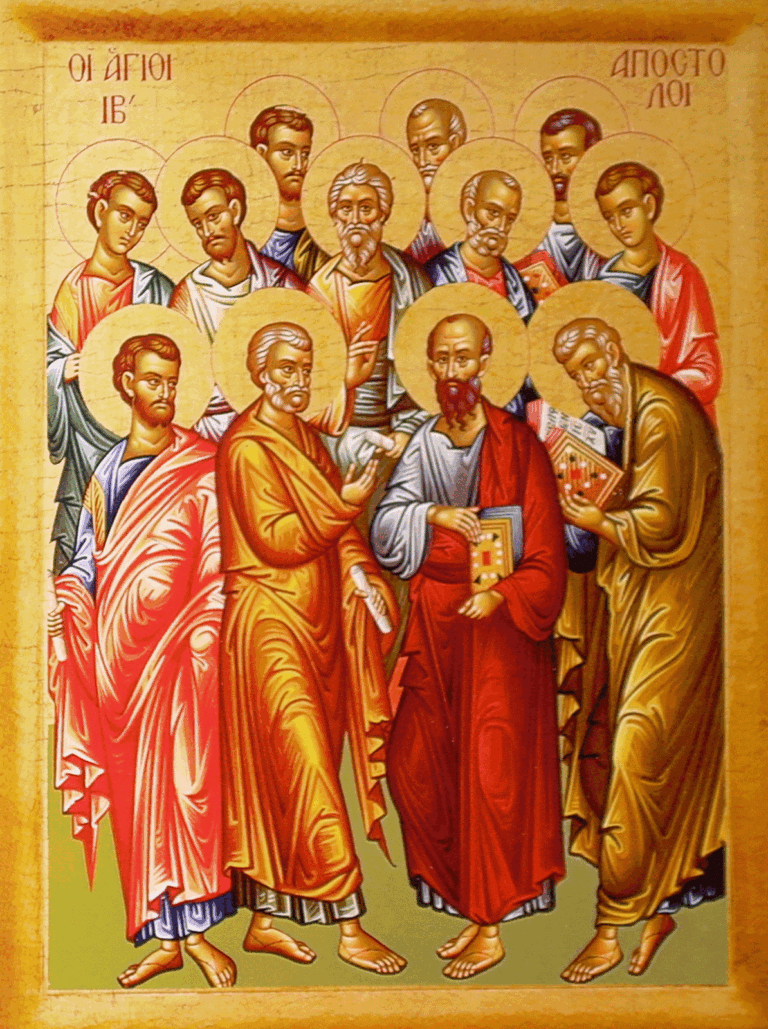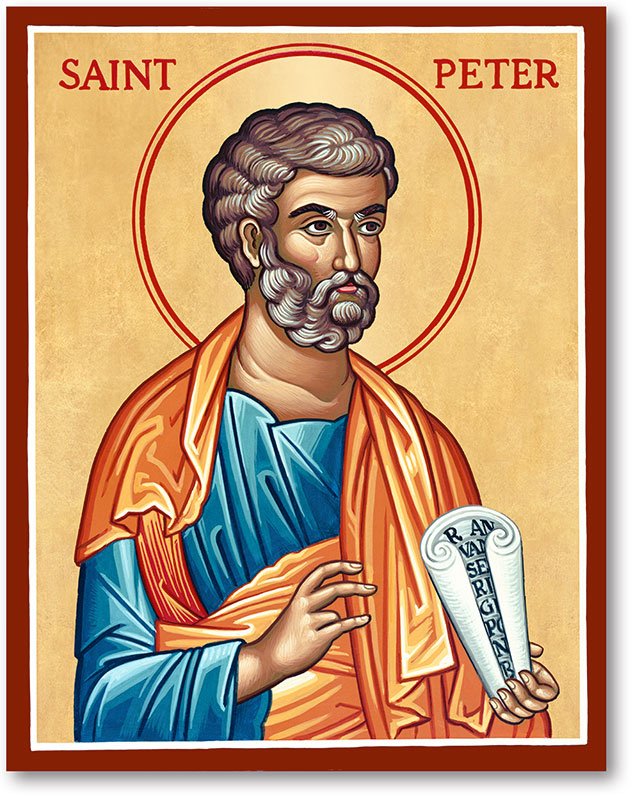
ST. Peter
Peter the Apostle, Simon Peter, Simeon, Simon, or Cephas .
Without question, Peter was a "duh"-ciple most people can identify with. One minute he was walking on water by faith, and the next he was sinking in doubt. Impulsive and emotional, Peter is best known for denying Jesus when the pressure was on. Even so, as a disciple he was dearly loved by Christ, holding a special place among the twelve.
Peter, a spokesman for the twelve, stands out in the Gospels. Whenever the men are listed, Peter's name is first. He, James, and John formed the inner circle of Jesus' closest companions. These three alone were given the privilege of experiencing the transfiguration, along with a few other extraordinary revelations of Jesus.
After the resurrection, Peter became a bold evangelist and missionary, and one of the greatest leaders of the early church. Passionate until the end, historians record that when Peter was sentenced to death by crucifixion, he requested that his head be turned toward the ground because he did not feel worthy to die in the same manner as his Savior.
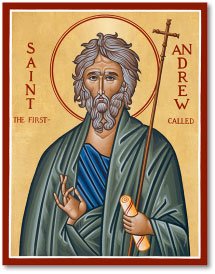
ST. Andrew
The apostle Andrew abandoned John the Baptist to become the first follower of Jesus of Nazareth, but John the Baptist didn't mind. He knew his mission was to point people to the Messiah. Like many of us, Andrew lived in the shadow of his more famous sibling, Simon Peter. All four Gospels identify Andrew as Peter's brother. The pair was from Bethsaida, a town north of the Sea of Galilee. Andrew led Peter to Christ, then stepped into the background as his boisterous brother became a leader among the apostles and in the early church. The Gospels don't tell us a great deal about Andrew, but reading between the lines reveals a person who thirsted for truth and found it in the living water of Jesus. In the life of Andrew, we discover how a simple fisherman dropped his nets on the shore and went on to become a remarkable fisher of men.
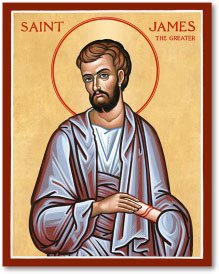
ST. James
Each of the synoptic Gospels identify James as an early disciple of Jesus. James the son of Zebedee, often called James the Greater to distinguish him from the other apostle named James, was a member of Christ's inner circle, which included his brother, the apostle John, and Peter. Not only did James and John earn a special nickname from the Lord — "sons of thunder" — they were privileged to be at the front and center of three supernatural events in the life of Christ. In addition to these honors, James was the first of the 12 apostles to be martyred for his faith in A.D. 44.
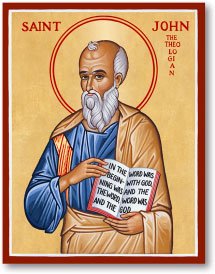
ST. John
The apostle John, brother to James, was nicknamed by Jesus one of the "sons of thunder," but he liked to call himself "the disciple whom Jesus loved." John was probably younger than James since he is usually mentioned after him. Together with their father Zebedee, the brothers were fishermen when Jesus called them. With his fiery temperament and special devotion to the Savior, John gained a favored place in Christ's inner circle. His enormous impact on the early Christian church and his larger-than-life personality, make him a fascinating character study. His writings reveal contrasting traits. For instance, on the first Easter morning, with his typical zeal and enthusiasm, John raced Peter to the tomb after Mary Magdalene reported that it was now empty. Although John won the race and bragged about this achievement in his Gospel (John 20:1-9), he humbly allowed Peter to enter the tomb first. According to tradition, John outlived all of the disciples, dying of old age in Ephesus, where he preached a gospel of love and taught against heresy.
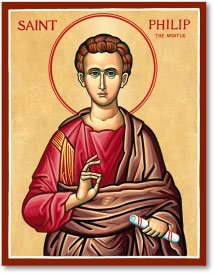
ST. Philip
Philip was one of the first followers of Jesus Christ, and he wasted no time calling others, like Nathanael, to do the same. Philip plays a larger role in the Gospel of John than he does in the other three Gospels. In John 14:8–9, Philip asks Jesus, "Lord, show us the Father, and we will be satisfied.” Jesus replies, “Have I been with you all this time, Philip, and yet you still don’t know who I am? Anyone who has seen me has seen the Father!"(NLT) Although little is known about him after the ascension of Christ, Bible historians believe Philip preached the gospel in Phrygia, in Asia Minor, and died a martyr there at Hierapolis. One thing we know for certain, Philip’s search for the truth led him directly to the promised Messiah.
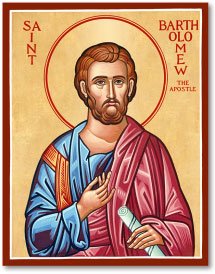
ST. Nathanael or Bartholomew
Nathanael, believed to be the disciple Bartholomew, experienced a jarring first encounter with Jesus. When the apostle Philip called him to come and meet the Messiah, Nathanael was skeptical, but he followed along anyway. As Philip introduced him to Jesus, the Lord declared, "Here is a true Israelite, in whom there is nothing false." Immediately Nathanael wanted to know, "How do you know me?" Jesus got his attention when he answered, "I saw you while you were still under the fig tree before Philip called you." Well, that stopped Nathanael in his tracks. Shocked and surprised he declared, "Rabbi, you are the Son of God; you are the King of Israel." Nathanael garnered only a few lines in the Gospels, nevertheless, in that instant, he became a loyal follower of Jesus Christ.

ST. Matthew
Levi, who became the apostle Matthew, was a customs official in Capernaum who taxed imports and exports based on his own judgment. The Jews hated him because he worked for Rome and betrayed his countrymen. But when Matthew the dishonest tax collector heard two words from Jesus, "Follow me," he left everything and obeyed. Like us, he longed to be accepted and loved. Matthew recognized Jesus as someone worth sacrificing for, so he gave up his comfortable life to serve and follow him
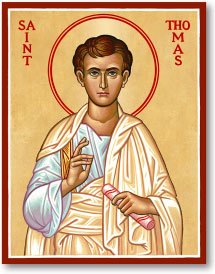
ST. Thomas
The apostle Thomas is often referred to as "Doubting Thomas" because he refused to believe that Jesus had risen from the dead until he saw and touched Christ's physical wounds. As far as disciples go, however, history has dealt Thomas a bum rap. After all, each of the 12 apostles, except John, abandoned Jesus during his trial and death at Calvary. Thomas was prone to extremes. Earlier he had demonstrated courageous faith, willing to risk his own life to follow Jesus into Judea. There is an important lesson to be gained from studying Thomas: If we're truly seeking to know the truth, and we're honest with ourselves and others about our struggles and doubts, God will faithfully meet us and reveal himself to us, just as he did for Thomas.
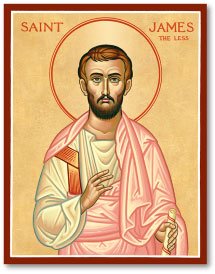
ST. James the less
James the Less is one of the most obscure apostles in the Bible. The only things we know for certain are his name and that he was present in the upper room of Jerusalem after Christ ascended to heaven. In Twelve Ordinary Men, John MacArthur suggests that his obscurity may have been the distinguishing mark of his life. It's quite possible that James the Less' complete anonymity reveals something profound about his character.
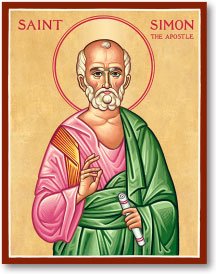
ST. Simon the Zealot
Who doesn't like a good mystery? One puzzling question in the Bible is the exact identity of Simon the Zealot, the Bible's own mystery apostle. Scripture tells us almost nothing about Simon. In the Gospels, he is mentioned in three places, but only to list his name. In Acts 1:13 we learn that he was present with the apostles in the upper room of Jerusalem after Christ had ascended to heaven. Beyond those few details, we can only speculate about Simon and his designation as a Zealot.
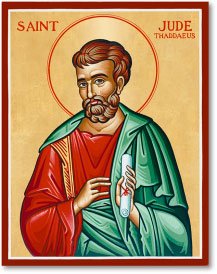
ST. Thaddeus or Jude
Compared to more prominent apostles in Scripture, little is known about Thaddeus in the Bible. Part of the mystery stems from him being called by several different names, including Thaddeus, Jude, Judas, and Thaddaeus. One thing we know for certain, as one of the twelve apostles, Thaddeus was a close friend and follower of Jesus Christ. His name means "gift of God" in Greek and is derived from a Hebrew word meaning "breast."
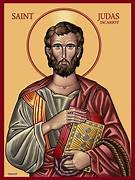
Judas Iscariot
Judas Iscariot is the apostle who betrayed Jesus with a kiss. For this supreme act of treachery, some would say Judas Iscariot made the greatest error in history. Down through time, people have had mixed feelings about Judas. Some experience a sense of hatred toward him, others feel pity, and some have even considered him a hero. No matter how you react to Judas, one thing is certain, believers can benefit greatly by taking a serious look at his life.

